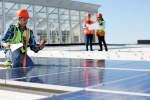This article has been translated by PwC Indonesia as part of our Indonesia Infrastructure News Service. PwC Indonesia has not checked the accuracy of, and accepts no responsibility for the content.
Investor Daily - Proyek PSN dorong investasi
4 April 2024
By Eva Fitriani, Rangga Prakoso, and Euis Rita Hartati
Jakarta, ID – The appointment of Pantai Indah Kapuk 2 (PIK 2) and Bumi Serpong Damai (BSD) as national strategic projects (PSNs) by the government is expected to enhance the investment climate, especially in the property sector.
The government made the decision at an internal meeting at the State Palace on 18 March.
BSD is a project of a Sinar Mas Land company, PT Bumi Serpong damai Tbk (BSDE). Meanwhile, PIK 2 is the continuity of a joint venture of Salim Group (SG) and Agung Sedayu Group (ASG).
From 2016 to February 2024, a total of 195 PSNs worth Rp1,519 trillion have been fully operational. Additionally, there are 77 projects and 13 programmes currently under construction or partially operational with a combined value of Rp2,960.7 trillion. Furthermore, 41 PSNs are projected to be completed in 2024.
Indonesia Chamber of Commerce and Industry (Kadin) Regional Autonomy Development Vice Chairperson Sarman Simanjorang expressed that businesses viewed this decision positively. He intends to invite various investors to consider investing in both areas.
“As financing will be fully provided by potential investors, there is room for more investors in both areas,” Sarman said to Investor Daily in Jakarta on Wednesday (3/4/2024).
According to Sarman, by becoming PSNs, spatial planning, permits, energy supply, and other aspects will be supported by the government, so they will be more attractive to potential investors.
“Be it investments in the property sector, the culinary sector, the transportation sector, or other sectors. I think that they will provide enough space for potential investors,” he said.
Moreover, Sarman continued that it was important to increase investment growth in 2024 and the future. “Moreover, we know that the investment target this year is around Rp1,650 trillion. So, they will provide sufficient space for investors, including foreign and domestic investors,” he added.
He also emphasised that the appointment of the PSN status did not burden the state budget (APBN) as all expenses would be covered by potential investors. In response, the government plans to introduce regulations or incentives to facilitate investment.
A similar statement was made by a property observer, Panangian Simanungkalit. He said that the appointment of the PSN status for PIK 2 and BSD could be a momentum for both developers to construct affordable housing. He mentioned that housing backlog currently reached 12.7 million individuals. This means that, currently, the upper middle class and the lower middle class are battling for housing.
“The PSN [status] is a catalyst for affordable housing. It will be appreciated by the people and the country,” Panangian said to Investor Daily in Jakarta on Wednesday (3/4/2024).
Panangian said that projects holding the PSN status must provide an extensive impact for the people. For example, he mentioned that toll road projects facilitated public connectivity. Besides that, there are port projects that boost export activities. According to him, PIK 2 and BSD developers do not need to construct affordable housing in PIK 2 and BSD. He mentioned that the construction of affordable housing could be made in other areas.
“The PSN status was proposed by Jokowi to construct affordable housing. It is impossible for all major developers to undertake such a task,” he said.
Meanwhile, Indef Senior Economist Tauhid Ahmad said that the inclusion of PIK 2 and BSD on the list of national strategic projects signified that both projects caught the attention of the central government and were significant to the national economic growth.
“So, the attention of the government is focused on them,” he said to Investor Daily.
Next, he said that it was only a matter of how far the government could focus on projects in both areas through fiscal and non-fiscal incentives.
Tauhid added that the appointment of PIK 2 and BSD as PSNs would increase the added value of both areas in the eyes of investors. “If there is attention from the government, there will be support. If there are issues in the field, the central government will not hesitate to get involved,” he said.
Similarly, a capital market observer and Pasardana Co-founder, Hans Kwee, believes that the inclusion of BSD and PIK 2 on the list of PSNs will accelerate the construction of several projects in the area.
“Investors will also be interested in investing there, especially in PIK 2 where many projects are being constructed,” he stated.
Previously, the Coordinating Ministry for Economic Affairs said that PIK 2 and BSD were set as PSNs as the government saw many positive values of the projects.
Special Staff to the Coordinating Minister for Economic Affairs Ahmed Zaki Iskandar said that many permits in BSD and PIK 2 have not been completed. For example, technical recommendations from relevant ministries for development can take up to two years.
Hence, the government is providing support as there are many positive aspects from the development of these areas.
“Moreover, several ministries are engaged in different sectors, such as infrastructure, tourism, education, health, and the environment. This is what hinders investors in carrying out their activities,” he said.
Zaki said that, even though they were PSNs, the development of PIK 2 and BSD would not use the APBN. He continued that the PSN status would only help expedite the recommendation process for construction from relevant ministries.
“So, the process from planning to development will be easier,” Zaki said.
He mentioned that BSD would be concentrated on construction in the educational, biomedical, and digital sectors, utilising 59.6 hectares (ha) of land.
Out of the total area, 49 hectares will be allocated for the establishment of both national and international universities, with a specific focus on faculties such as medical, pharmaceutical, and technological faculties.
Meanwhile, 10 ha will be used to construct a biomedical centre. In the area, hospitals, health clinics, and other health facilities and infrastructure will be constructed to develop Indonesia’s medical and health sector.
The total investment in BSD is projected to reach Rp18.54 trillion. The project aims to employ 10,065 workers, save Rp10.1 trillion in foreign exchange, and generate Rp5.6 trillion in foreign exchange earnings.
“Overall, the project is expected to directly and indirectly employ 10,065 workers. It anticipates saving Rp10.1 trillion in foreign exchange and acquiring Rp5.6 trillion from the development of health and biomedical services,” he added.
Meanwhile, PIK 2 will develop a green area and an eco-city known as Tropical Coastland, complete with a mangrove tourism area. This zone is poised to become a new green tourism destination, attracting tourists.
“In PIK 2, there is currently 200 ha of mangrove forest. There will be another 200 ha that will be made as a tourism destination and a settlement,” he explained.
The investment value in PIK 2 is predicted to reach Rp65 trillion with a forecast to absorb 6,235 workers directly and 13,550 from its multiplier effect.
















